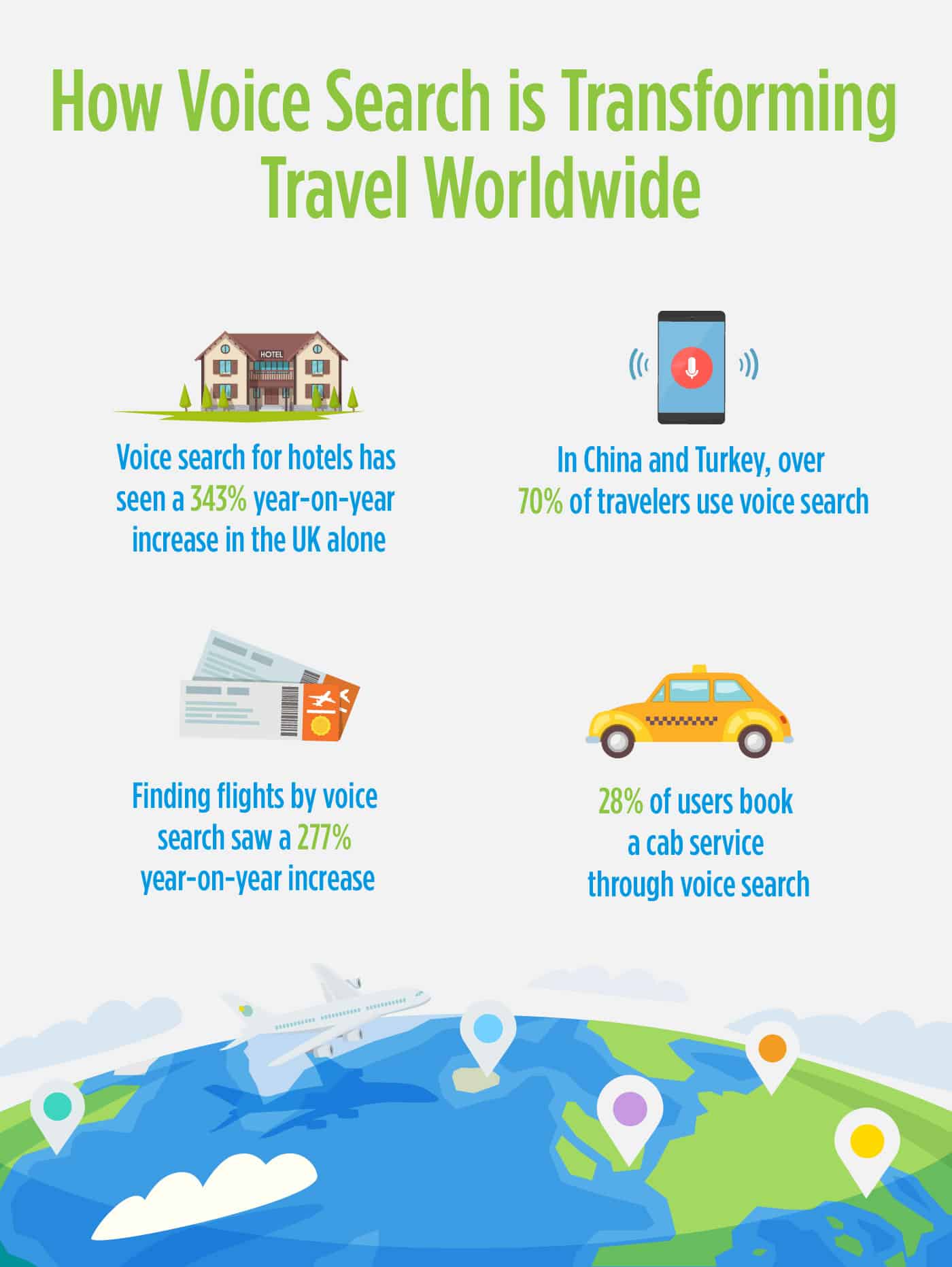
How Voice Search Is Making a Lasting Impact in Travel Marketing

The Impact of Voice Search in Travel Marketing
“Alexa, what’s the cheapest flight from Miami to Dallas?” One simple question to a smart device, and a few moments later, your flight is booked. Travelers worldwide are hopping on this voice search trend, using voice assistants like Siri and Alexa to help them make educated travel decisions. And with only an 8% error rate in speech recognition, users are becoming more and more trusting of the intelligence of this technologically advanced tool.
The convenience of voice search has shifted consumer behavior and the way they approach everything from everyday tasks like turning house lights on and off, to big-ticket purchases like booking a beachside resort in the Caribbean for two. It’s become so successful that hotels like Marriott and the Wynn Las Vegas have gained attention for their voice-enabled technology integration to help guests manage room temperatures, TVs, lights and more.
Because of voice search, travelers are consuming information, making purchases and experiencing the world vastly different than just a few years ago. But what does this mean for travel marketers? Considering 72% of people have used voice search through a digital assistant in just 2019, it means it’s time to reevaluate your SEO strategy to get on board with this groundbreaking tech trend.
From SEO to VSO (Voice Search Optimization)
Search engine optimization is still one of the most dominating marketing tools in the travel industry, driving traffic and revenue to airlines, hotels and destination websites through relevancy and highly ranked keywords. While SEO reigns king for the marketing space, there’s an up-and-coming search tool that’s here to make a home in your SEO strategy.
Voice search optimization, otherwise known as VSO, isn’t here to take over your SEO strategy, it’s here to strengthen it. Combining traditional SEO, technical SEO and conversational patterns, voice search optimization opens the gate to a new and untouched marketing segment for the travel industry.
So how do you enhance your SEO strategy to incorporate VSO? The bottom line is this—a conversational tone with longtail keywords in your content across the board will rank higher when travelers are asking voice assistants for answers.
How to Optimize Travel and Tourism for Voice Search

Unlike traditional SEO research, voice search optimization relies on conversational keywords for better ranking. These searches are usually long-tail keywords and in the form of a question. For example, instead of typing “things to do in Sebring, Florida” on a search engine, your traveler might voice search “what are the top free things to do in Sebring, Florida?”
This means that your content needs to be armed with the appropriate keywords to target a voice search traveler like this. Here are a couple ways you can optimize your travel website for voice search.
Strengthen your website’s FAQ page
Your frequently asked questions (FAQ) page is the traveler’s version of a cheat sheet. Meaning, everything they need to know prior to visiting your travel destination will be broken down into a Q&A format here, either directing them to the appropriate page of your website or answering up front in a short summary.
An effective FAQ page covers a broad range of intent and reflects your audience needs accordingly, whether it be price breakdowns, locations and directions, or even handy tips on what to wear or bring during their stay.
But how does an FAQ page come into play with voice search? SEO experts are reintroducing FAQ pages in website checks and website improvement areas solely for the benefits of voice search. Think about it—FAQ pages are essentially a compilation of common, travel-related voice search questions for your destination.
Localize your VSO keywords
There were over a billion voice searches per month last year, and 40% of those mobile searches had local intent. The convenience of voice search for travelers doesn’t just stop at planning for future travels, it expands all the way through the duration of their stay. So much, that Google disclosed that “near me” searches have grown over 130% year over year.
This means that mobile-driven travelers are using voice assistants to find things to do, places to eat and where to go, all in real time. And if your website isn’t optimized for voice search, it’s a missed opportunity for both parties involved. That’s why localized long-tail keywords should naturally weave through your website content to reach those last-minute planners.
Voice Search Is Convenient but Human Connection Is Evergreen
Integrating voice search as part of the travel experience can enhance the stay of your guests through convenience. But in the midst of optimizing your content for voice search, don’t forget the authenticity that human interaction can bring to your destination. Be ready to interact with your guests and make them feel welcome through the experience that only a well-trained team can offer. After all, travel is all about experience, and experience is not only supported by the connection a traveler makes with the destination, but also its surrounding people.